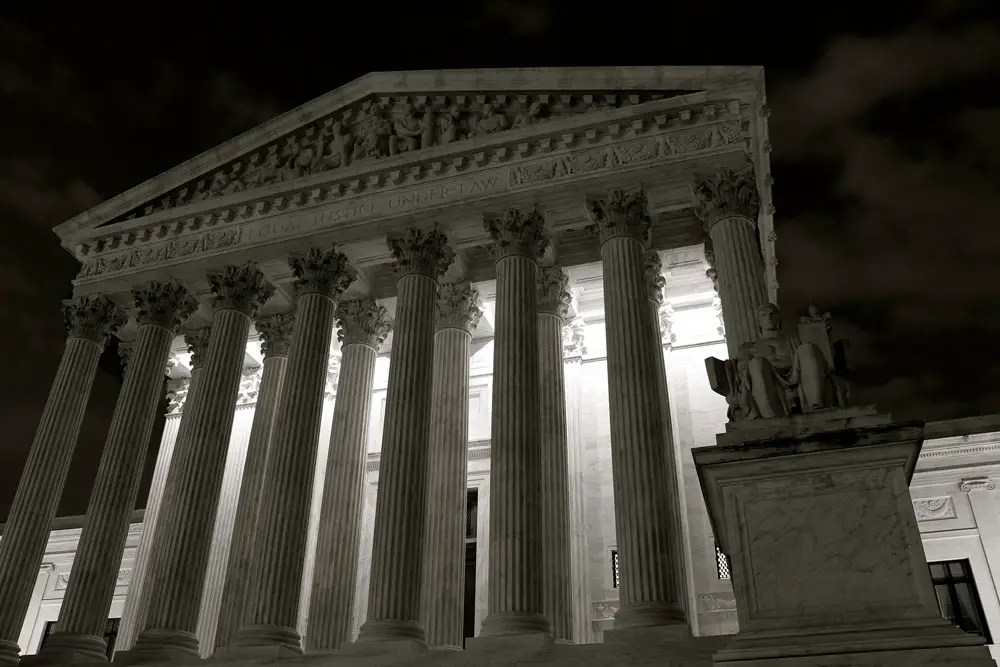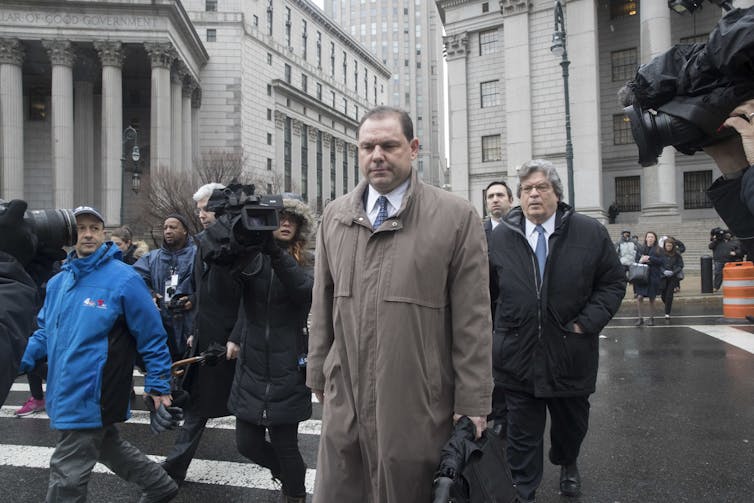
By Ciara Torres-Spelliscy
The U.S. Supreme Court is deregulating corruption, with arguably grim consequences for American democracy.
The latest example of this troubling trend was the case known as Snyder v. United States. At first glance, this may have seemed like a narrow, wonky case about whether a part of the U.S. criminal code that outlaws bribery also covers “gratuities.”
Yet the court’s decision, issued on June 26, 2024, kneecaps federal prosecutors’ power to go after corrupt government officials.
Snyder follows a pattern of the current Supreme Court I’ve documented in three books. Since John Roberts became its chief justice in 2006, the court has made prosecuting corruption, especially at the state and local level, nearly impossible for federal prosecutors.
Gift, gratuity or bribe?
The Snyder case centered on a former mayor of Portage, Indiana, who was charged with violating federal anti-corruption law while he was mayor. He accepted US$13,000 from a truck company in 2014 after the city had signed a $1.1 million contract to buy trash trucks.
Mayor James Snyder showed up at the trucking business and said, “I need money.” He claimed the payment was a consulting fee, or gratuity.
In a 6-3 decision, along ideological lines, the court’s conservative majority overruled the lower court that convicted Snyder of bribery and the appeals court that had affirmed his conviction. The mayor should not have been prosecuted, the justices said, because federal anti-corruption statute Section 666 in question covers only bribes and not gratuities.
And bribes, it said, are paid before an official action, not after that official action is complete.
In his majority opinion, Justice Brett Kavanaugh explained why it’s not desirable for federal prosecutors to go after small-time local crooks. For one thing, he argued, many states and cities already have their own laws about politicians and gratuities; thus, the Department of Justice need not play Big Brother.
“Section 666 does not supplement those state and local rules by subjecting 19 million state and local officials to up to 10 years in federal prison for accepting even commonplace gratuities,” Kavanaugh wrote.
Deregulating campaign finance
The Supreme Court has also been narrowing what counts as corruption in campaign finance.
In a 2007 case called WRTL II, the court blew a huge hole in a federal campaign finance law called the Bipartisan Campaign Reform Act, also known as McCain-Feingold. Among other regulations, McCain-Feingold had barred “electioneering communication,” when corporations and unions buy campaign ads in the lead-up to voting.
In WRTL II, the court ruled that “corruption” in political campaigns must be “of the ‘quid pro quo’ variety, whereby an individual or entity makes a contribution or expenditure in exchange for some action by an official.”
This definition means that a briber must be cartoonishly bold in demanding a specific vote from a lawmaker in exchange for cash. Most bribery in the real world is more subtle, as the Supreme Court once recognized.
Under Roberts’ predecessor, Chief Justice William Rehnquist, the majority of justices – both left-leaning and right-leaning – saw efforts by political donors to set the agenda for political parties and elected officials as an improper corruption of the political process.
As the Rehnquist Court once concluded, corruption occurs “not only as quid pro quo agreements, but also as undue influence on an officeholder’s judgment, and the appearance of such influence.”
Money in politics
The Roberts Court’s most notorious acquiescence to money in politics was Citizens United. Issued in 2010, the Citizens United decision decided that corporations have a First Amendment right to spend as much money as they want on political ads in any American election.

Dedraw Studio via Getty
Limiting corporate spending on political ads has “a chilling effect” on corporate free speech, Justice Anthony Kennedy wrote, and the government’s “anti-corruption interest” does not trump that concern.
The court reiterated this stance in 2014, when it threw out the federal limit of $123,000 in total donations per person to federal candidates over a two-year election cycle. In McCutcheon v. FEC, the court again insisted that campaign finance regulations must target only quid pro quo corruption – or “dollars for political favors.”
“Campaign finance restrictions that pursue other objectives impermissibly inject the Government” into deciding who wins an election, wrote Roberts in his majority opinion.
The chief justice was unswayed by arguments that strong campaign finance rules ensure rich and poor have an equal say in elections.
“No matter how desirable it may seem, it is not an acceptable governmental objective to ‘level the playing field,’” he wrote in McCutcheon.
Today, individual donors may sink unlimited funds into a federal election.
Redefining fraud
The Roberts Supreme Court has substantially narrowed the definition of corruption in white-collar crime cases, too.
In 2016’s McDonnell v. United States, the justices declared that Virginia Gov. Bob McDonnell did nothing wrong when he touted a dubious health product on behalf of a man who had paid for McDonnell’s wife’s clothes and his daughter’s wedding.
Four years later, the Supreme Court decided that the federal government could not prosecute a woman named Bridget Anne Kelly involved in the 2013 Bridgegate Scandal, when aides to New Jersey Gov. Chris Christie, including Kelly, intentionally caused a stifling traffic jam on the George Washington Bridge to punish one of Christie’s political opponents.
“Not every corrupt act by state or local officials is a federal crime,” wrote Justice Elena Kagan, typically considered a liberal justice, in Kelly v. United States.
The Supreme Court continued this trend in a 2023 case called Percoco v. United States.
Joseph Percoco, an aide to New York Gov. Andrew Cuomo, had been convicted of fraud in 2018 for accepting $315,000 from two New York-based corporations to promote policies that favored their businesses. The Supreme Court threw out the conviction, in large part because the money exchanged hands while he was working on Cuomo’s 2014 election campaign – meaning he was not technically in government.

Mary Altaffer/AP
Yet, Percoco used a New York government phone approximately 837 times during that period, suggesting he wanted the outside world to perceive him as a government insider with access to political power.
Traditionally, private individuals found to have “dominated and controlled” government business, as Percoco was alleged to have done, could be guilty under federal law of what’s called “honest-services-fraud.” Since Percoco, that term now covers only bribery and kickbacks.
The Supreme Court’s lax stance on corruption endangers the integrity of American democracy, as I explain in my latest book, “Corporatocracy.” From McDonnell to Kelly to Percoco to Snyder, its rulings have eviscerated anti-corruption law. That sends a message to the corrupt: “You can be venal with few legal consequences.”
Corrupt people get a pass; good government takes another hit.
![]()
Ciara Torres-Spelliscy is Professor of Law at Stetson University.





























Laurel says
This is incredibly shameful.
Section 666…Kushner’s building 666… I’m beginning to believe…
Joe D says
Laurel,
“666”….I don’t think you are alone in your CONCERNS…
Joe D says
I read the ruling weeks ago with my mouth open, shaking my head in DISBELIEF! I wondered why the Media GENERALLY ignored the court ruling. I guess it was happening as the Biden/Harris Campaign morphed into the Harris/Walz Campaign, so it got lost in the MEDIA FRENZY. Thank you , Flaglerlive for bringing our attention back to it!
Bribes, Gifts, “Gratuities”….depending on when you receive them?!? How RIDICULOUS!
If you are in public office and have decision making and policy making public power or influence related to a particular contractor/program/industry/ individual…you should either disqualify yourself from participating in the decision making, or abstain from final voting due to a “CONFLICT OF INTEREST.” That would be the HONORABLE/MORAL thing to do. However Moral and Honorable aren’t words I’m using too often recently with many courts or public officials.
No wonder the younger generation is LAUGHING at us when we talk about the “RULE of LAW.” The rules are changed depending on who is in power! So why not lie, cheat and steal….even the FORMER PRESIDENT and members of Congress (on BOTH sides of the aisle) are doing it…why shouldn’t THEY….GOOD QUESTION!!
…ANYONE have the ANSWER?!?
…VOTING might be a START…I am REPEATEDLY saddened by the low voter TURNOUT in even PRESIDENTIAL elections, much less “off year” elections, or local elections. People in some other Countries are DYING for the right to participate in FREE and OPEN elections, and large groups of Americans are SQUANDERING that hard won right, by sitting home!
SHAME on US! We deserve the leadership we end up with!
Ed P says
It appears the average citizen is thought to be just too dumb to “get anything”. We must be devolving instead of evolving. Have the elites and ruling class almost beaten “we the people” into submission?
Maybe common sense should be called uncommon sense, because it’s used so rarely.
Add this to the list of the rapidly increasing number of incredulous events we witness and endure – effectively keeping us in a state of vertigo.
Ever ponder when the pendulum will no longer swing so wildly left and right and return back to center so we can regain our bearings?
Laurel says
Ed P: Interesting. You see the pendulum swinging far to the left, and I have (as a lifelong Independent) never seen such an extreme swing to the far right, where politicians want to control our bodies, our loves, our reading materials, our religion, our genitals, our clothing, our freedom of expression and make women nothing more than incubators, and non-child bearing women useless, with no say in our country.
You stated you have to hold your nose to vote for your preferred politician. I do not.
Let the pendulum swing!